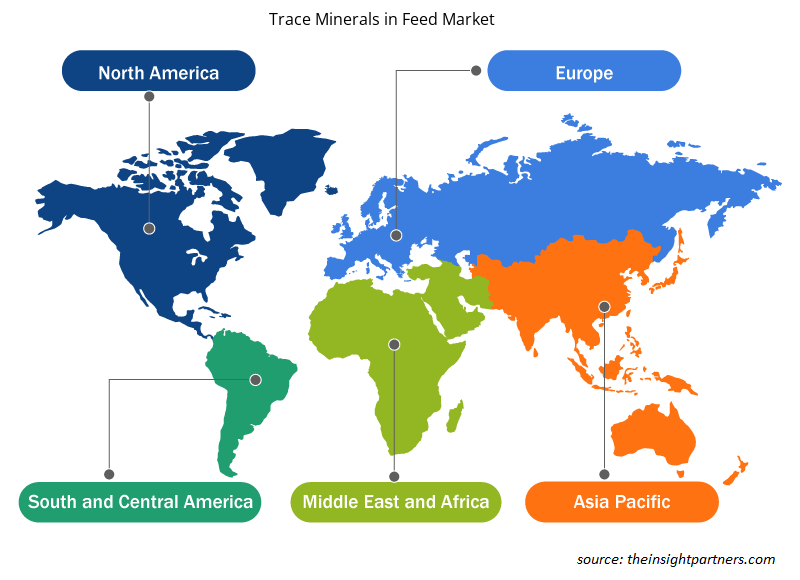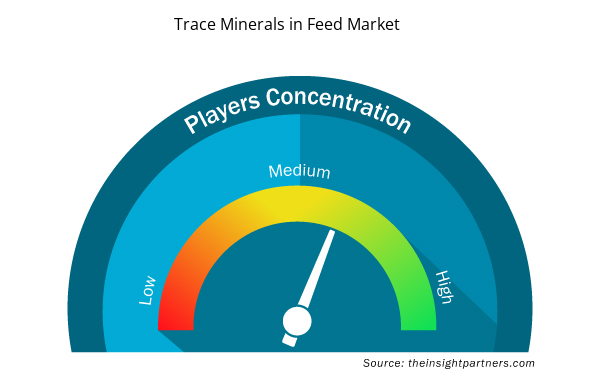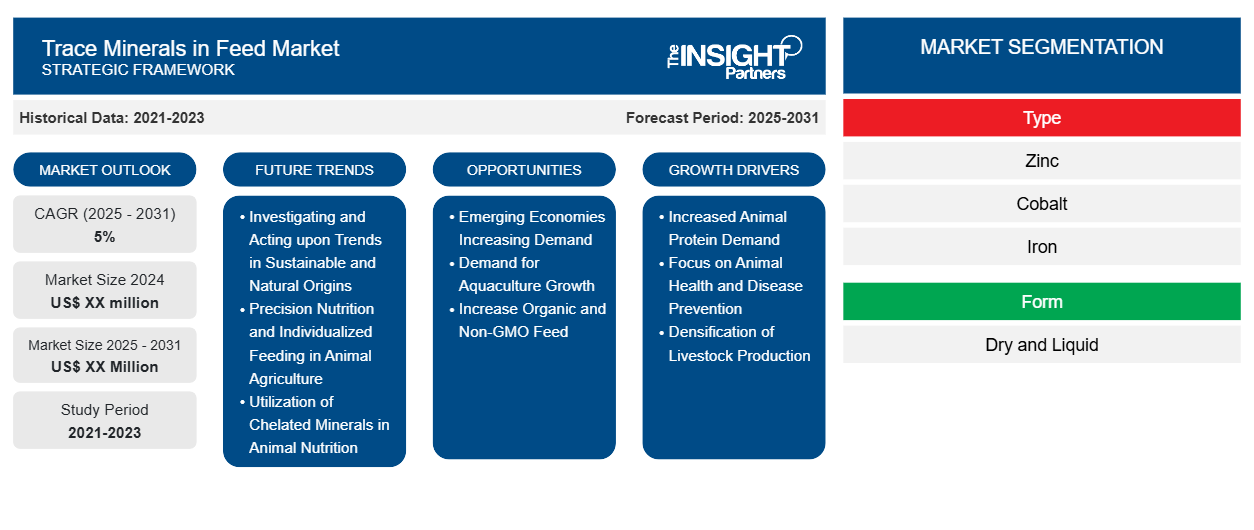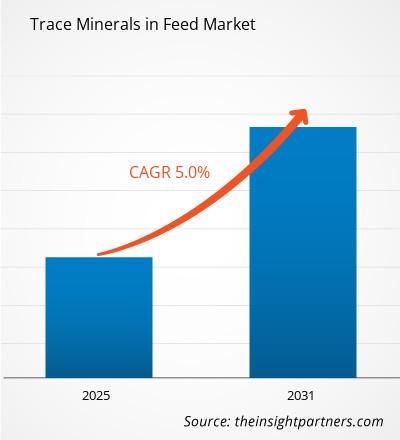The Trace Minerals in Feed Market is expected to register a CAGR of 5% from 2024 to 2031, with a market size expanding from US$ XX million in 2024 to US$ XX Million by 2031.
The trace minerals in feed market report is segmented by type (zinc, cobalt, iron, copper, and others). The market is segmented based on form (dry and liquid). The market is segmented based on livestock (poultry, ruminants, swine, aquaculture, and others). The market size and forecast at global, regional, and country levels for all the key market segments are covered under the scope. The report offers the value in USD for the above analysis, segments, regions, and countries. The report covers market trends, as well as market dynamics such as drivers, restraints, and key opportunities. The report also covers industry landscape and competition analysis covering market concentration, heat map analysis, prominent players, and recent developments in the market.
Purpose of the Report
The report Trace Minerals in Feed Market by The Insight Partners aims to describe the present landscape and future growth, top driving factors, challenges, and opportunities. This will provide insights to various business stakeholders, such as:
- Technology Providers/Manufacturers: To understand the evolving market dynamics and know the potential growth opportunities, enabling them to make informed strategic decisions.
- Investors: To conduct a comprehensive trend analysis regarding the market growth rate, market financial projections, and opportunities that exist across the value chain.
- Regulatory bodies: To regulate policies and police activities in the market with the aim of minimizing abuse, preserving investor trust and confidence, and upholding the integrity and stability of the market.
Trace Minerals in Feed Market Segmentation
Type
- Zinc
- Cobalt
- Iron
- Copper
Form
- Dry and Liquid
Livestock
- Poultry
- Ruminants
- Swine
- Aquaculture
Geography
- North America
- Europe
- Asia-Pacific
- South and Central America
- Middle East and Africa
Customize This Report To Suit Your Requirement
You will get customization on any report - free of charge - including parts of this report, or country-level analysis, Excel Data pack, as well as avail great offers and discounts for start-ups & universities
- Get Top Key Market Trends of this report.This FREE sample will include data analysis, ranging from market trends to estimates and forecasts.
Trace Minerals in Feed Market Growth Drivers
- Increased Animal Protein Demand: With population growth, demand rises for animal-based protein sources, including meat, eggs, and dairy. The livestock keeping is spreading with this increase, creating a growing offer of high-quality animal feed. Among its critical constituents are trace minerals like zinc, copper, manganese, and selenium, all referred to in the milling and feeding for livestock, because they are reached by the biological needs of livestock, and are essential to the livestock growth, development, and health status. These minerals importantly improve feed efficiency, immunity, and reproductive health, and thus are included in modern nutrient portfolios in animal nutrition.
- Focus on Animal Health and Disease Prevention: Animal health has always been the uppermost concern of farmers and the livestock industry. Trace minerals have been proven to benefit animal health in the enhancement of immune function as well as prevention of metabolic disorders and improvement in resistance to diseases. With diseases and infections rampant nowadays affecting livestock, there's a strong realization on the significance of adding trace minerals into the diet of the animals to boost their immune systems and cut down on antibiotics, whereby the productivity of livestock has generally increased. This is all in the name of moving from curative medicine into prevention and disease management.
- Densification of Livestock Production: The trend in the world is towards intensification of livestock farming-husbanding animals in controlled environments yet with sufficiently high outputs. These have been making animal feed needs for nutritionally heightened supplements. Production systems in intensive farming practices normally give rise to nutrient imbalances, which have caused trace minerals to be supplemented in animal feeds to facilitate best growth, reproduction, and productivity. Factory farming and larger-scale production establishments have increased the need for trace minerals to promote animal health and productivity.
Trace Minerals in Feed Market Future Trends
- Investigating and Acting upon Trends in Sustainable and Natural Origins: In light of rising concerns for the environment, there has been an increasing craving for feed ingredients coming from sustainable and natural sources. Livestock farmers and feed manufacturers are putting great emphasis to try to reduce their contributions to the damage caused to the environment. Such trends include a growing interest in sourcing trace minerals from sustainable, otherwise environmentally friendly sources other than the traditional minerals. Moreover, according to consumers, they should have access to natural, synthetic trace mineral products. Consequently, feed manufacturers are looking for bio-based and environmentally friendly alternatives to trace mineral supplementation such as plant-based or algae-derived sources of trace minerals to lessen the carbon footprint of animal feeds.
- Precision Nutrition and Individualized Feeding in Animal Agriculture: Exactly Right Nutrition, Individualized Feeds- the latest in animal nutrition technology is paving the way for perfect feeding, wherein diets can also be formulated appropriately according to individual animal needs or production systems, and this includes the precise formulation of trace minerals according to age, weight, breed, and production stage (growth, reproduction, or lactation). Hence, as livestock producers are moving to more personalized alternatives of feeding, the demand for precision minerals will be rising and focused more on the actual incorporation of definite nutrients for better feed efficiency and livestock health.
- Utilization of Chelated Minerals in Animal Nutrition: The trend to use chelated minerals—that is, trace minerals bound to organic molecules for improved bioavailability-in animal feed would continue growth. Chelated minerals are easily absorbed and utilized and hence their administration leads to improvement in animals' health status and feed efficiency. This also affects intensively raised animals, which are often unable to obtain sufficient amounts of minerals from conventional feed. The developing livestock production systems would also require chelated trace minerals as increased focus is given to the intensification of livestock production with accompanying waste minimization.
Trace Minerals in Feed Market Opportunities
- Emerging Economies Increasing Demand: The trace minerals in feed markets have been experiencing accelerated growth in the emerging economies of Asia Pacific and Latin America as well as among parts of Africa. The emerging economy increases the demand for meat, dairy, and other animal products as income rapidly increases; hence, trace minerals increase demand for animal productivity and health. New market opportunities would be available for feed manufacturers, providing novel approaches for cost-effective incorporation of trace mineral products to meet local farming practices.
- Demand for Aquaculture Growth: The affinity shown by an ever-increasing population towards seafood drives aquaculture, making it one of the fastest-growing segments of the industry. Just like any other animal, fish is dependent on trace minerals for growth, immunity, and reproduction. However, the growing demand for aquaculture production has also resulted in an increase of trace minerals in fish feed. This gives room for innovations in creating products that will suit the particular nutritional needs of aquatics, such as high bioavailability minerals for fish and shellfishes.
- Increase Organic and Non-GMO Feed: Given the consumer preference for organic and non-GMO animal products, there is a growing demand for organic and non-GMO feed ingredients for farm animals. Such interests include trace minerals found natural, organic, and non-GMO sources from farmers who want to meet the expressed needs of consumers for cleaner, more sustainable animal products. By offering such trace minerals certified as organic or non-GMO, feed manufacturers can respond to this market segment and surf the wave of growth that is saturating organic and sustainable agriculture.
Trace Minerals in Feed Market Regional Insights
The regional trends and factors influencing the Trace Minerals in Feed Market throughout the forecast period have been thoroughly explained by the analysts at Insight Partners. This section also discusses Trace Minerals in Feed Market segments and geography across North America, Europe, Asia Pacific, Middle East and Africa, and South and Central America.

- Get the Regional Specific Data for Trace Minerals in Feed Market
Trace Minerals in Feed Market Report Scope
| Report Attribute | Details |
|---|---|
| Market size in 2024 | US$ XX million |
| Market Size by 2031 | US$ XX Million |
| Global CAGR (2025 - 2031) | 5% |
| Historical Data | 2021-2023 |
| Forecast period | 2025-2031 |
| Segments Covered |
By Type
|
| Regions and Countries Covered | North America
|
| Market leaders and key company profiles |
Trace Minerals in Feed Market Players Density: Understanding Its Impact on Business Dynamics
The Trace Minerals in Feed Market market is growing rapidly, driven by increasing end-user demand due to factors such as evolving consumer preferences, technological advancements, and greater awareness of the product's benefits. As demand rises, businesses are expanding their offerings, innovating to meet consumer needs, and capitalizing on emerging trends, which further fuels market growth.
Market players density refers to the distribution of firms or companies operating within a particular market or industry. It indicates how many competitors (market players) are present in a given market space relative to its size or total market value.
Major Companies operating in the Trace Minerals in Feed Market are:
- Alltech
- Archer-Daniels-Midland Company
- BASF SE
- Bluestar Adisseo Co., Ltd
- Cargill, Incorporated
Disclaimer: The companies listed above are not ranked in any particular order.

- Get the Trace Minerals in Feed Market top key players overview
Key Selling Points
- Comprehensive Coverage: The report comprehensively covers the analysis of products, services, types, and end users of the Trace Minerals in Feed Market, providing a holistic landscape.
- Expert Analysis: The report is compiled based on the in-depth understanding of industry experts and analysts.
- Up-to-date Information: The report assures business relevance due to its coverage of recent information and data trends.
- Customization Options: This report can be customized to cater to specific client requirements and suit the business strategies aptly.
The research report on the Trace Minerals in Feed Market can, therefore, help spearhead the trail of decoding and understanding the industry scenario and growth prospects. Although there can be a few valid concerns, the overall benefits of this report tend to outweigh the disadvantages.
- Historical Analysis (2 Years), Base Year, Forecast (7 Years) with CAGR
- PEST and SWOT Analysis
- Market Size Value / Volume - Global, Regional, Country
- Industry and Competitive Landscape
- Excel Dataset

Report Coverage
Revenue forecast, Company Analysis, Industry landscape, Growth factors, and Trends

Segment Covered
This text is related
to segments covered.

Regional Scope
North America, Europe, Asia Pacific, Middle East & Africa, South & Central America

Country Scope
This text is related
to country scope.
Frequently Asked Questions
Precision nutrition and customized feed are expected to be the key market trends.
Based on geography, Asia Pacific held the largest share of the trace minerals in feed market due to the strong growth of the animal feed industry in the region.
Based on type, the iron segment is expected to witness the fastest growth during the forecast period.
Focus on animal health and disease prevention are driving the market growth.
Alltech, ADM, BASF SE, Nutreco N.V., Kemin Industrie Inc, NOVUS INTERNATIONAL, Orffa, Zinpro Corp, Cargill Incorporated, and DR. ECKEL ANIMAL NUTRITION GMBH and CO. KG are the key players operating in the trace minerals in feed market.
The Trace Minerals in Feed Market is estimated to witness a CAGR of 5% from 2023 to 2031
Trends and growth analysis reports related to Chemicals and Materials : READ MORE..
1. Alltech
2. Archer-Daniels-Midland Company
3. BASF SE
4. Bluestar Adisseo Co., Ltd
5. Cargill, Incorporated
6. Koninklijke DSM N.V.
7. Novus International
8. Nutreco N.V.
9. Orffa
10. Zinpro




 Get Free Sample For
Get Free Sample For